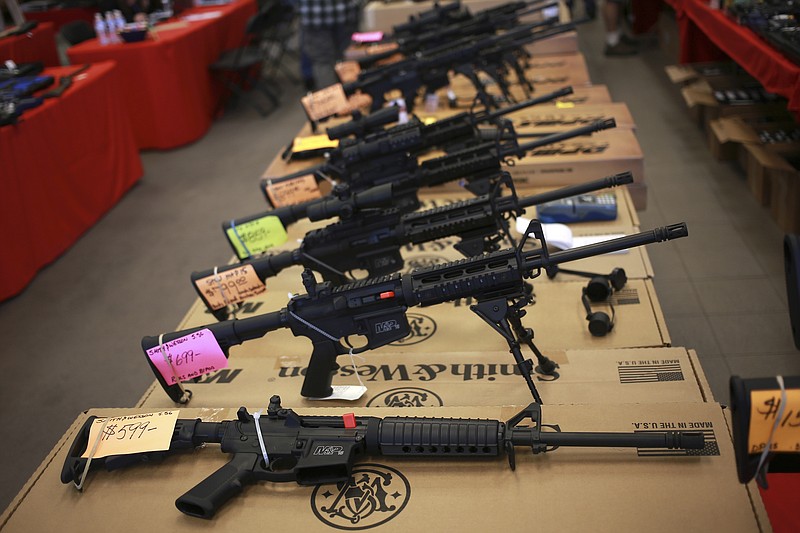Conservative Americans no less than liberal Americans want to see the end of mass shootings in this country.
But neither side seems to want to give an inch on their stances about guns, who can have them, what kind they can have, and whether all those who have them should have background checks or register their guns.
Indeed, we're not sure either political side wants things to change. What would they argue about in relation to guns? How would they raise money off the issue?
The crux of the problem, it has always seemed to us, is the number of guns in the gunisphere - we made that up - that are not registered, not known and not purchased.
Who has them, how many do they have and how will we ever know?
When we consider that point, all the sane ideas about universal background checks, gun registration, closing loopholes and gun buy-backs fall apart. It's not that such laws couldn't be enacted - they could - but they would have little effect on those who obtain their guns in the shadows, keep them in the shadows and bring them from the shadows to use them in nefarious ways.
After all, it's law-abiding people who would be the most apt to submit to a background check, register their gun, learn how to use it, store it safely, use it properly, and, if it ever came to it, turn it over in a mandatory gun buy-back. The criminal element doesn't care about any of that and won't be bothered by it.
Further, what's to stop disturbed individuals who desire to commit a mass shooting from doing so? Because they may have submitted to a background check, registered their gun and learned to use it properly, too.
Patrick Crusius, the accused gunman in the Aug. 3 shooting in El Paso, in which 22 were killed and dozens more were wounded, bought his AK-47-style assault rifle legally. According to reports, ATF agents were able to trace it quickly.
The gun owner in Texas needed only to be 21 without any pending criminal charges, which would have been verified by the National Instant Criminal Background Check system
Connor Betts, the accused gunman in the Aug. 4 shooting in Dayton, in which nine were killed and at least 14 wereinjured, bought his AR-15-style, short-barrelled rifle legally from an online retailer in Texas. It was then transferred to him by a local firearms dealer, who would have been required to perform a background check.
His background check, according to reports, would not have prevented him from buying a gun.
Many of the far left 2020 Democratic presidential candidates say they are open to mandatory gun buy-back programs similar to one in Australia that has been credited with reducing gun violence in that country. If we could collect every gun in the country, start over with new rules and create a better, fairer and safer system, we'd be all for it.
But we can't, and the disingenuous candidates know that.
They also never mention it, but Democratic-dominated Chicago is an example of the failure of attempting to legislate guns out of use. Last weekend was the most deadly of the year for the Illinois city, with 48 shot and nine killed. But it has some of the strictest gun control laws in the country.
No one there until age 21 can purchase a gun, and owners must have licenses, background checks and endure waiting periods. Judges there can remove guns from owners deemed to be a threat to themselves. And legislation creating a fingerprint database of gun owners is in the works.
The problem is most of the guns there are in the shadows.
For those reasons, we have always resisted absolutes in background checks, registrations and gun-type banning, plus telling manufacturers what they can and cannot make. We also want to be realistic on what might pass Congress.
Let's face it. Confiscating guns is going nowhere. Any type of gun buy-back scheme is going nowhere. Eliminating the Second Amendment to the Constitution is going nowhere.
If President Donald Trump gets behind it, though, could another national assault rifle ban be passed? One was in effect from 1994 to 2004. Could loopholes be closed about not having to register guns if they're purchased at a gun show or privately? Could devices that convert single-firing guns to rapid-fire guns be made illegal or restricted?
We don't believe those so-called "common-sense" gun regulations will prevent all mass shootings. People who want to perpetrate such violence will find the guns if they so desire, but such regulations might prevent some of them.
The American people, to our belief, are not all or nothing. They're not for taking away the right to own a gun they believe is a constitutional right, and they're not for the mass proliferation of guns - everybody, everywhere and every kind. But we believe the president and the Congress should look determinedly at regulations that have a chance to make a difference. Wouldn't every life saved be worth it?
